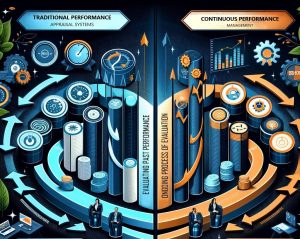In today’s rapidly evolving workplace, Human Resource professionals face a significant challenge in assessing and improving employee performance. Traditional performance appraisal systems, while long-standing components of organizational strategy, are increasingly under scrutiny. Let’s delve into why many managers question their effectiveness, the nature of performance appraisals, employee evaluations, and how company reviews made by employees can play a critical role in this process.
Understanding performance appraisal: beyond the basics
Performance appraisal is a systematic process in which the performance of employees is evaluated, typically on an annual basis. However, it’s more than just an annual review; it’s an ongoing process that involves setting work standards, providing feedback, and understanding the goals and needs of each employee. The purpose is not just to evaluate, but to motivate and align employees’ efforts with the broader objectives of the organization.
The scepticism surrounding performance appraisals
Many managers express doubts about the effectiveness of performance appraisal systems. These doubts stem from various factors:
- Subjectivity and bias: traditional methods can be prone to biases, leading to unfair evaluations.
- Lack of real-time feedback: annual reviews often overlook the day-to-day achievements and challenges.
- One-size-fits-all approach: standardized appraisal systems may not cater to the diverse needs and roles within an organization.
Modern performance appraisal systems are evolving to be more continuous, feedback-oriented, and tailored to individual employees. Incorporating tools like 360-degree feedback, self-assessments, and regular check-ins can enhance their effectiveness.
Employee evaluation: a holistic approach
Performance reviews, when conducted effectively, can be empowering. They should be a two-way dialogue where feedback is constructive, and employees feel heard and valued. The focus should shift from mere evaluation to development, growth, and mutual understanding.
Employee evaluation should encompass more than just job performance. It should consider personal development, skill acquisition, and career aspirations. A holistic approach acknowledges that employees are multifaceted individuals with varying strengths and potential.
Moving beyond traditional appraisals
The shift from traditional performance appraisal systems to continuous performance management marks a significant change in how employee performance is assessed and enhanced in the modern workplace. This transition reflects an evolving understanding of what drives employee engagement and productivity.
Traditional appraisals, typically conducted annually, often focus on evaluating past performance against set benchmarks. This approach can be limiting as it provides feedback long after actions have been taken, making it less relevant and actionable. In contrast, continuous performance management is a more dynamic, ongoing process. It involves regular check-ins and feedback, goal setting, and frequent communication between managers and employees.
Implementing continuous performance management
Transitioning to a continuous performance management system requires a shift in organizational culture and mindset. It involves training managers to provide constructive, regular feedback and coaching. Organizations should also invest in tools and platforms that facilitate ongoing performance discussions and goal tracking.
While beneficial, the shift to continuous performance management can be challenging. It requires a commitment from both management and staff to engage in regular, meaningful dialogues about performance. There’s also a need for flexibility, as goals may need to be adjusted more frequently to respond to changing business needs.
The power of company reviews by employees
Company reviews by employees, often shared on platforms like Glassdoor, provide insights into the organizational culture and effectiveness of appraisal systems. These reviews can serve as valuable feedback for HR to fine-tune appraisal processes and improve workplace satisfaction.
Rethinking performance appraisal systems
For HR professionals, rethinking performance appraisal systems is not just about adopting new methods, but about fostering a culture of continuous improvement, inclusivity, and open communication. It represents a modern approach to employee development and engagement. This model emphasizes real-time feedback, goal alignment, and continuous dialogue, offering a more holistic and effective way of managing performance in today’s dynamic work environment. By embracing this approach, organizations can not only foster a more responsive, engaged, and high-performing workforce, but also enhance employee performance, boost engagement and retention.





